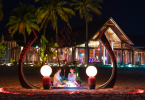Happy days: The Equator Village hotel on the southernmost island of Gan is a family-friendly option
- Equator Village is a small beach-side hotel situated on the southern island of Gan
- The hotel is built on the site of a former RAF base which retains colonial history
- In peak winter season, a couple can stay, full board, for around £180 a night
You don’t — unless you’re a Clooney or a Rooney — visit the Maldives with several small children in tow.
But here we are, at drinks o’clock on a tropical atoll, being handed ripe coconuts and a large machete. We are about to quench our thirsts the old-fashioned way.
This involves using a potentially lethal weapon to create a mouth-sized hole through which to guzzle coconut water, while being careful not to thwack off a finger.
My children — William, seven, Megan, five, and Henry, two — take all this in their stride, while I shake my head in disbelief that we’ve made it here, to one of the world’s most exclusive holiday destinations.
Our secret? Let me introduce you to Equator Village, a small beach-side hotel situated on Gan, the southernmost of the roughly 1,200 small islands dotted around the Indian Ocean which make up the nation of the Maldives.
In a country where resorts tend to be shiny affairs, purpose-built by global chains on otherwise-uninhabited desert islands, this is an entirely different kettle of fish (or, as the locals say, ‘mas’).
First, the hotel is built on the site of a former RAF base which still reeks of colonial history. Second, and most importantly, Gan is part of a connected string (or atoll) of islands where around 20,000 people actually live.
As a result, there is no need for the hotel to go about the expensive business of shipping in staff and supplies. This makes it, by Maldivian standards, a bargain: even in peak winter season, a couple can stay, full board, for around £180 a night.
For that, you live like a hedge-funder: three meals a day, all the booze you can sink, and a host of boat trips to view shoals of dolphins, picnic on deserted sandbanks, catch fish at sunset and enjoy other tropical beach holiday staples.
We slept in two of Equator Village’s 78 rooms, joined by a door. Air-conditioned and spick and span, they were converted from huts where troops lived before the site was abandoned by the RAF in 1978.

Roughly 1,200 small islands dotted around the Indian Ocean which makes up the nation of the Maldives, pictured
All this is set in picturesque gardens, where chickens peck by day, comically enormous fruit bats swoop at dusk, and hammocks are slung between well-placed palm trees.
The hotel centres on a rambling colonial bungalow where the restaurant knocks out tasty buffet meals with a local flavour (one of the many breakfast options is fish curry) and a bar serve snazzy cocktails. It used to be the Sergeants’ Mess, and the airy games room still contains their snooker table.
Life here is, of course, all about kicking off shoes (I didn’t wear them all week) and slowing down. We devoted hours to bobbing in the pool, building sandcastles on the beach, chasing lizards and paddling among shoals of tropical fish.
Twice daily, the resort runs free boat trips to nearby coral reefs. After teaching William and Megan to snorkel in the swimming pool, my wife, Katie, and I took them to experience the real thing. It was like swimming in a vast aquarium, filled with giant turtles, (harmless) six-foot reef sharks, and rays the size of a dinner table.
Keen surfers, we also occasionally billeted the children with nannies (at just £4 an hour) to explore some of the island’s top surf spots, which are entirely deserted and ridiculously photogenic.
From time to time, we also explored the rest of the island — the hotel provides free bikes to guests — to discover how real people live in this fascinating and unique corner of Asia. All of which brings me back to that machete and those coconuts.
They were provided by an elderly woman called Waheeda who lives in a village called Feydhoo, where she occasionally hosts guests from Equator Village who want to learn about traditional Maldivian life.

Guy, Katie and the children, who devoted hours to bobbing in the pool, building sandcastles on the beach, chasing lizards and paddling among shoals of tropical fish
When we arrive at her tin-roofed hut, she has laid out a proper lunch: fish curry, plantain, rice, breadfruit, broth and pancakes, mostly cooked over a charcoal fire or baked in an oven powered by dried coconut shells. Everything is, needless to say, sensational.
Gan forms part of Addu Atoll, a chain of small islands, several of them connected via causeways. The ten-mile ‘main’ road, going from north to south, is officially the nation’s second-longest.
The island also has its own airport, with regular flights from Colombo, Sri Lanka, meaning you can get there without an expensive sea plane or speedboat transfer.
Later on our tour, we discovered that behind the idyllic beauty lies a colourful history. Residents are fiercely independent — they even attempted to secede from the Maldives in the late Seventies — and the islands are a stronghold of political opposition.
That means, they say, that you holiday there without supporting the country’s iffy dictatorship — making this heavenly desert island as easy on your conscience as it is on your wallet.
Full details are available at the link below:







